- HomeHome
-
About ACIAR
- Our work
- Our people
-
Corporate information
- ACIAR Audit Committee
- Commission for International Agricultural Research
- Policy Advisory Council
- Agency reviews
- Executive remuneration disclosure
- Freedom of information (FOI)
- Gifts and benefits register
- Information publication scheme
- List of new agency files
- Contracts
- Legal services expenditure
- Privacy impact assessment register
- Commonwealth Child Safe Framework
- Benefits to Australia
- Careers
- 40 years of ACIAR
-
What we do
- Programs
- Cross-cutting areas
- Resources
- Where we work
-
Funding
- Research projects
- Fellowships
-
Scholarships
- John Allwright FellowshipScholarships to study in Australia for ACIAR partner country scientists to have Australian postgraduate qualifications
- ACIAR Pacific Agriculture Scholarships and Support and Climate Resilience Program
- Alumni Research Support Facility
- Publications
- News and Outreach
Date released
07 April 2020
Up until a couple of years ago, Sughran Mehboob knew nothing about modern irrigation.
Like many farmers in Pakistan, the mother of four living in the central eastern province of Punjab simply flooded her crops with water from the canal. But that was not efficient, because many crops do not grow well when the soil is consistently wet and evaporation from the field is significant. Water availability in the province is also declining due to more frequent dry spells.
Now Mrs Mehboob and her husband allocate water efficiently, taking into account variables such as the time of year and soil conditions. To capitalise on better irrigation planning, they have even started growing high-value crops like onion seeds which have yielded ‘big income’.
‘I am feeling good,’ says Mrs Mehboob. ‘Many of my relatives and friends even come to get free vegetables from [me].’ Mrs Mehboob is one of 900 beneficiaries of the ACIAR-funded project ‘Developing approaches to enhance farmer water management skills in Balochistan, Punjab and Sindh in Pakistan’ which has been operating since October 2016. By creating and scaling up irrigation techniques, the four-and-a-half-year project aims to improve the livelihoods of small and middle-sized farmers at the frontline of a deepening water crisis.
Over the past decade Pakistan has been hit with major floods and long periods of drought. Rising temperatures, more intense rainfall and a growing threat of floods stemming from melting glaciers are just some of the risks that are exacerbated by climate change and will add additional strain on what is already one of the most water-stressed countries in the world.
To help tackle these issues the project team led by Dr Sandra Heaney-Mustafa, Senior Lecturer of community education at the University of Canberra, took a collaborative approach that emphasises the importance of local knowledge.
In practice that started with drawing together stakeholders—farmers, agricultural scientists, government officials—to both share their thoughts on the challenges farming families face and offer realistic solutions. That way, each person could understand and benefit from the others’ perspectives.
Afterwards, Dr Heaney-Mustafa and her colleagues tested three different learning models designed to improve water management:
- value management, which aimed to get people to think of value as being multi-faceted rather than just in terms of money
- collaborative problem solving, which put farmers in the driver’s seat to identify priorities and create and then implement an action plan
- discovery learning, which provided farmers with the resources to experiment rather than imposed specific solutions.
Each of the models also introduced soil moisture monitoring tools from project partners, including the Pakistan Council for Research on Water Resources (PCRWR) and the Commonwealth Scientific and Industrial Research Organisation (CSIRO). For instance, a PCRWR-produced tensiometer visually monitored soil moisture conditions, while the CSIRO-developed FullStop wetting front detector measured the progress of water across the field and collected a sample of irrigation water to measure salt and nitrate levels.
Feedback showed that the individual leaning models were not ideal, but aspects of each were useful.
Farmers found value management too complicated but liked the ‘SWOT’ (strength, weaknesses, opportunities and threats) institutional analysis method. Collaborative problem solving ‘engaged farmers but they lacked the support of a learning mechanism in the field’. Discovery learning was ‘a really good way’ to let farmers be researchers but they needed ongoing support and received limited visits by facilitators.
So, the researchers took the best parts of each model and used them to create a fourth model: the Farmer Integrated Learning Model (FILM). FILM is still under trial in six districts but Dr Iftikhar Hussain, Project Coordinator of the Pakistani Society of Facilitators and Trainers, which is one of the project’s partners, says the model and the tools it has introduced have already resulted in less water and fertiliser being used for irrigation.
Farmers have also seen improvements in the quality and yield of their crops.
More recently, Dr Heaney-Mustafa and her colleagues undertook their biggest challenge yet: scaling out. Knowing that farmers trusted their peers more than anyone else, the team trained volunteer farmer beneficiaries to go to neighbouring villages to teach other farmers FILM.
Mrs Mehboob was one of these. She says her trips have not only helped her female students learn better irrigation techniques but have had positive effects on her as well. ‘Before this [project] I was feeling hesitant in communication,’ says Mrs Mehboob. ‘This project has given [me] confidence and I am feeling good that I am providing services to other farmers.’
Dr Heaney-Mustafa says she hopes Pakistani farmers continue to use FILM even after the project ends this year—‘not just for water and irrigation management, although that is vital, but for other aspects of agriculture and improving livelihoods’.




